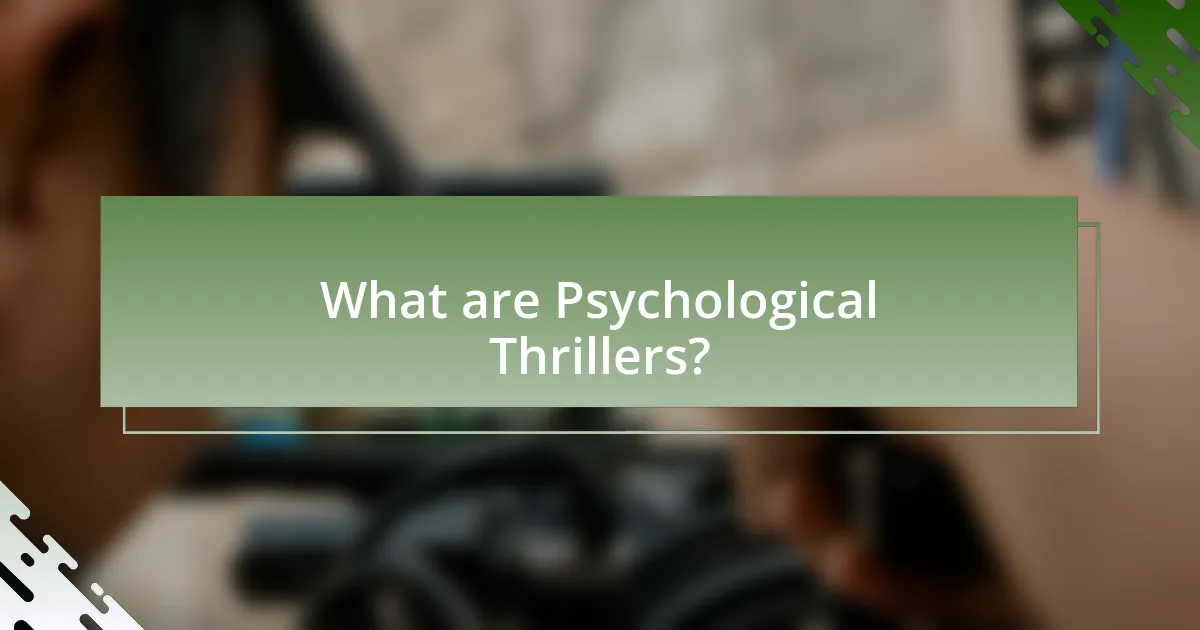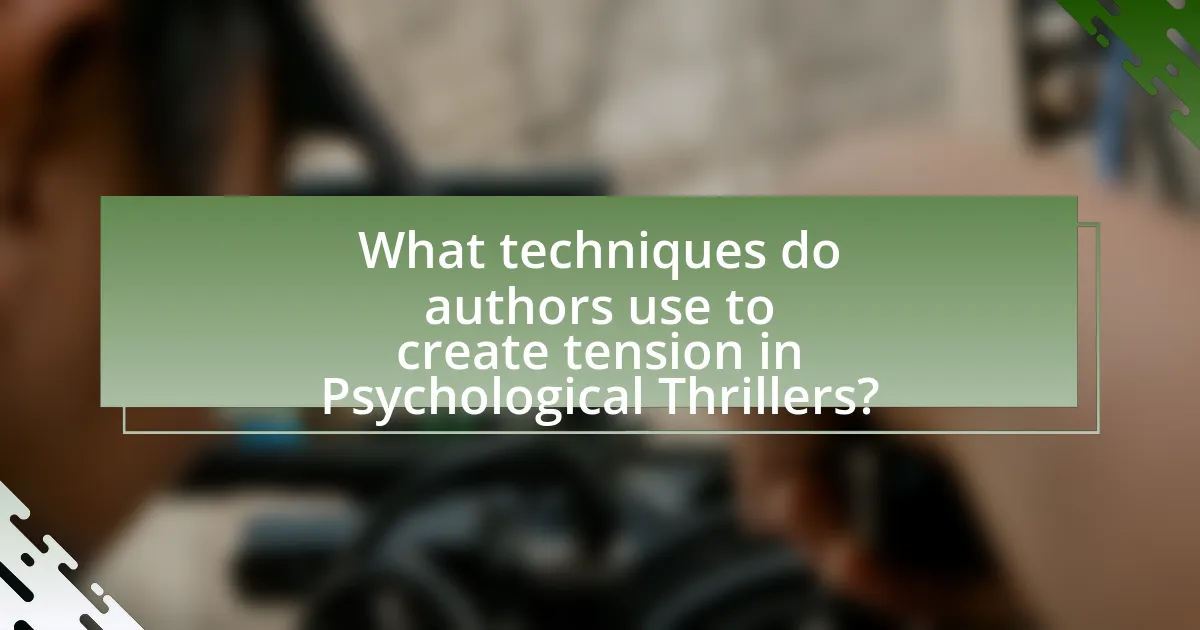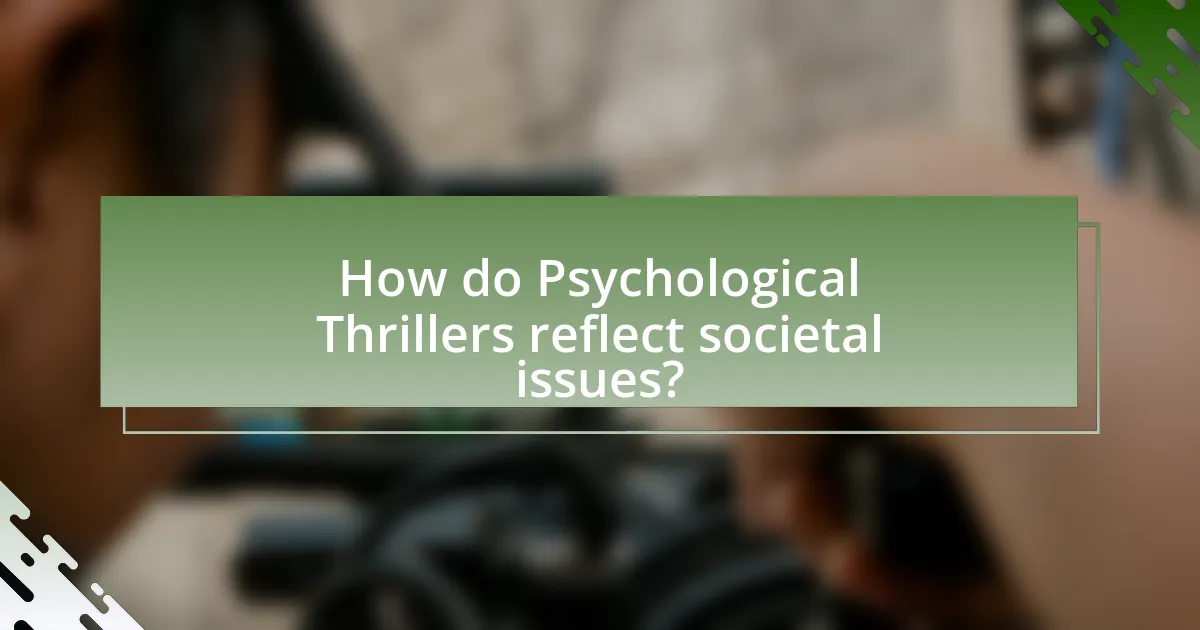Psychological thrillers are a subgenre of fiction that emphasizes the psychological states and motivations of characters, often exploring themes of mental instability, manipulation, and moral ambiguity. This article provides an in-depth analysis of psychological thrillers, highlighting their distinct characteristics compared to other genres, key elements that define them, and the themes commonly explored, such as identity and trauma. It also examines the techniques authors use to create tension, the role of character development, and how these narratives reflect societal issues and fears. Additionally, the article discusses the emotional impact of psychological thrillers on readers and offers tips for writing engaging stories within this genre.

What are Psychological Thrillers?
Psychological thrillers are a subgenre of fiction that focuses on the psychological states and motivations of characters, often involving complex narratives that explore themes of mental instability, manipulation, and moral ambiguity. These narratives typically create suspense and tension through the internal conflicts of characters rather than relying solely on external action or violence. For example, works like “Gone Girl” by Gillian Flynn and “The Silence of the Lambs” by Thomas Harris exemplify how psychological thrillers delve into the minds of their characters, revealing their fears, desires, and the darker aspects of human nature.
How do Psychological Thrillers differ from other genres?
Psychological thrillers differ from other genres primarily through their focus on the mental and emotional states of characters rather than external action or physical threats. This genre emphasizes psychological tension, exploring themes such as manipulation, obsession, and the complexities of the human mind. Unlike traditional thrillers that often rely on physical danger or crime, psychological thrillers delve into the internal struggles and moral ambiguities of characters, creating suspense through their psychological conflicts. For example, works like “Gone Girl” by Gillian Flynn illustrate how character motivations and psychological manipulation drive the narrative, distinguishing them from genres that prioritize plot-driven action or straightforward conflict resolution.
What key elements define a Psychological Thriller?
A Psychological Thriller is defined by its focus on the mental and emotional states of its characters, often exploring themes of paranoia, obsession, and the complexities of the human psyche. Key elements include unreliable narrators, intricate plot twists, and a strong emphasis on character development, which create tension and suspense. For instance, works like “Gone Girl” by Gillian Flynn exemplify these traits through their exploration of manipulation and psychological conflict, illustrating how characters’ motivations can lead to unexpected outcomes.
Why do readers gravitate towards Psychological Thrillers?
Readers gravitate towards psychological thrillers due to their ability to evoke intense emotional responses and engage the mind in complex narratives. These stories often explore the intricacies of the human psyche, presenting characters with deep psychological conflicts that challenge readers’ perceptions of reality. Research indicates that psychological thrillers stimulate cognitive engagement, as readers analyze motives and unravel plot twists, enhancing their overall reading experience. The genre’s focus on suspense and unpredictability keeps readers on edge, making them eager to turn pages and discover outcomes.
What themes are commonly explored in Psychological Thrillers?
Psychological thrillers commonly explore themes such as identity, manipulation, trauma, and the nature of reality. These themes are integral to the genre, as they delve into the complexities of the human mind and the psychological conflicts that arise from personal and external pressures. For instance, identity is often examined through characters who grapple with their sense of self, leading to twists that challenge the audience’s perception of who they truly are. Manipulation frequently appears in the form of deceitful relationships, where one character exerts control over another, creating tension and suspense. Trauma is another prevalent theme, as characters confront past experiences that shape their actions and decisions, often leading to psychological unraveling. Lastly, the nature of reality is questioned, with narratives that blur the lines between what is real and what is imagined, leaving both characters and readers in a state of uncertainty.
How do themes of paranoia and deception manifest in these stories?
Themes of paranoia and deception manifest in psychological thrillers through characters’ mistrust and manipulation of reality. In these stories, protagonists often experience heightened anxiety and suspicion, leading them to question the motives of those around them. For example, in “Gone Girl” by Gillian Flynn, the protagonist’s paranoia about her husband’s fidelity drives the narrative, revealing layers of deception that complicate their relationship. This interplay of paranoia and deception creates tension and uncertainty, compelling readers to engage with the characters’ psychological struggles. The effectiveness of these themes is evidenced by their ability to evoke emotional responses, as seen in the critical acclaim and popularity of works that explore such dynamics.
What role does the human psyche play in the narrative structure?
The human psyche serves as a fundamental element in narrative structure, particularly in psychological thrillers, by driving character motivations and plot developments. This influence manifests through the exploration of internal conflicts, emotional depth, and psychological realism, which engage the audience and create tension. For instance, characters often grapple with fears, desires, and moral dilemmas that shape their actions and decisions, thereby propelling the narrative forward. Research indicates that narratives that delve into psychological complexities, such as those by authors like Alfred Hitchcock and Gillian Flynn, effectively captivate audiences by reflecting the intricacies of human behavior and thought processes.

What techniques do authors use to create tension in Psychological Thrillers?
Authors create tension in psychological thrillers through techniques such as unreliable narration, pacing, and foreshadowing. Unreliable narration involves presenting a distorted perspective, which keeps readers questioning the truth and heightens suspense. Pacing is manipulated by alternating between fast and slow sequences, creating a rhythm that builds anticipation and anxiety. Foreshadowing subtly hints at future events, creating a sense of dread and expectation. These techniques are effective because they engage readers’ emotions and provoke a sense of unease, making them eager to uncover the unfolding mystery.
How does unreliable narration enhance the story?
Unreliable narration enhances the story by creating ambiguity and engaging the reader’s critical thinking. This narrative technique allows for multiple interpretations of events, which can heighten suspense and emotional investment. For instance, in psychological thrillers like “Gone Girl” by Gillian Flynn, the unreliable perspectives of the characters lead to twists that challenge the reader’s assumptions, ultimately deepening the narrative complexity. Such techniques compel readers to question the truth, fostering a more immersive experience as they piece together the reality behind the characters’ distorted perceptions.
What are the effects of an unreliable narrator on reader perception?
An unreliable narrator significantly alters reader perception by creating ambiguity and challenging the reader’s trust in the narrative. This narrative technique forces readers to question the truthfulness of the events and characters presented, leading to a more active engagement with the text. For instance, in works like “Gone Girl” by Gillian Flynn, the dual perspectives of unreliable narrators compel readers to piece together the actual story, enhancing suspense and emotional investment. Research indicates that narratives featuring unreliable narrators can increase cognitive engagement, as readers must analyze inconsistencies and infer meaning, ultimately deepening their connection to the story.
How can authors effectively implement twists and turns?
Authors can effectively implement twists and turns by carefully planting clues and misdirection throughout the narrative. This technique engages readers, allowing them to piece together information while also leading them to false conclusions. For instance, in Agatha Christie’s “And Then There Were None,” subtle hints are woven into the story, which, upon reflection, reveal the true nature of the plot twist. By balancing foreshadowing with red herrings, authors can create a satisfying surprise that feels both unexpected and inevitable, enhancing the psychological tension characteristic of thrillers.
What role does character development play in Psychological Thrillers?
Character development is crucial in psychological thrillers as it enhances the emotional depth and complexity of the narrative. Well-developed characters often exhibit psychological intricacies that drive the plot and engage the audience, creating suspense and tension. For instance, the gradual unveiling of a character’s motivations and fears can lead to unexpected twists, keeping readers invested in the story. Research indicates that strong character arcs can significantly impact audience empathy and engagement, making the psychological stakes more compelling. In psychological thrillers, the interplay between character flaws and external conflicts often serves to heighten the overall tension, illustrating the profound role character development plays in shaping the genre’s effectiveness.
How do complex characters contribute to the suspense?
Complex characters contribute to suspense by creating unpredictable dynamics and emotional depth that keep audiences engaged. Their intricate motivations and conflicting desires lead to tension-filled scenarios where the outcome is uncertain. For instance, in psychological thrillers, characters may exhibit duality, where their outward behavior contrasts sharply with their inner thoughts, leading to suspenseful moments as viewers question their true intentions. This complexity often results in plot twists that heighten suspense, as seen in works like “Gone Girl” by Gillian Flynn, where the protagonist’s multifaceted personality drives the narrative’s tension and unpredictability.
What psychological traits are often portrayed in protagonists and antagonists?
Protagonists often exhibit traits such as empathy, resilience, and moral integrity, while antagonists typically display traits like narcissism, aggression, and manipulativeness. Empathy in protagonists allows them to connect with others and drive their motivations, as seen in characters like Atticus Finch from “To Kill a Mockingbird,” who fights for justice despite societal pressures. In contrast, antagonists like Anton Chigurh from “No Country for Old Men” demonstrate a lack of empathy and a ruthless pursuit of their goals, showcasing traits that lead to conflict. These psychological traits are essential in creating tension and depth in narratives, as they influence character decisions and interactions, ultimately shaping the story’s outcome.

How do Psychological Thrillers reflect societal issues?
Psychological thrillers reflect societal issues by exploring themes such as mental health, crime, and moral ambiguity, often mirroring real-world anxieties and fears. For instance, films like “Fight Club” and “Black Swan” delve into the complexities of identity and societal pressures, highlighting the impact of consumerism and perfectionism on mental well-being. Additionally, the genre frequently addresses issues like violence and trauma, as seen in “Gone Girl,” which critiques media sensationalism and the public’s obsession with crime. These narratives serve as a lens through which audiences can examine and confront contemporary societal challenges, making psychological thrillers a powerful commentary on the human condition.
What societal fears are often mirrored in Psychological Thrillers?
Psychological thrillers often mirror societal fears such as the loss of control, the breakdown of trust in relationships, and the fear of the unknown. These themes resonate with audiences as they reflect real-world anxieties about personal safety, mental health, and societal instability. For instance, the fear of losing control is depicted through characters who experience psychological breakdowns, mirroring the increasing prevalence of mental health issues in society. Additionally, the breakdown of trust is illustrated in narratives where betrayal occurs, reflecting concerns about fidelity and loyalty in personal relationships. The fear of the unknown is commonly represented through unpredictable plot twists and ambiguous endings, which resonate with societal uncertainties in an ever-changing world.
How do these stories comment on mental health and societal norms?
Psychological thrillers often comment on mental health and societal norms by exploring the complexities of the human psyche and the impact of societal pressures. These narratives frequently depict characters grappling with mental illness, illustrating how stigma and misunderstanding can exacerbate their struggles. For instance, in works like “The Silence of the Lambs,” the portrayal of Hannibal Lecter and Clarice Starling highlights the intersection of trauma and societal expectations, revealing how individuals can be shaped by their environments. Additionally, research indicates that media representations of mental health can influence public perceptions, as seen in studies showing that negative portrayals can lead to increased stigma (Corrigan, 2004, “How stigma interferes with mental health care,” American Psychologist). Thus, psychological thrillers serve as a lens through which audiences can examine the often fraught relationship between mental health and societal norms.
In what ways do Psychological Thrillers address moral ambiguity?
Psychological thrillers address moral ambiguity by presenting complex characters whose motivations and actions challenge traditional notions of right and wrong. These narratives often blur the lines between hero and villain, forcing audiences to grapple with ethical dilemmas. For instance, characters may commit morally questionable acts for seemingly justified reasons, such as self-defense or protecting loved ones, which complicates the viewer’s ability to label them as purely good or evil. This complexity is evident in works like “Gone Girl” by Gillian Flynn, where the protagonist’s manipulative behavior raises questions about morality in the context of personal relationships. Such portrayals encourage viewers to reflect on their own moral beliefs and the societal norms that shape them, ultimately highlighting the subjective nature of morality.
What impact do Psychological Thrillers have on readers?
Psychological thrillers significantly impact readers by evoking intense emotional responses and stimulating critical thinking. These narratives often explore complex themes such as morality, identity, and the human psyche, which can lead readers to reflect on their own beliefs and experiences. Research indicates that engaging with psychological thrillers can enhance empathy and emotional intelligence, as readers are compelled to understand the motivations and emotions of multifaceted characters. Furthermore, studies show that the suspense and tension inherent in these stories can lead to increased adrenaline levels, creating a heightened state of awareness and engagement. This combination of emotional and cognitive stimulation makes psychological thrillers a powerful genre that influences readers on multiple levels.
How do these stories influence emotional responses and thoughts?
Psychological thrillers influence emotional responses and thoughts by engaging the audience’s fears, anxieties, and moral dilemmas. These narratives often create suspense and tension through complex characters and unpredictable plots, prompting viewers to empathize with characters’ struggles and question their own beliefs. Research indicates that stories with high emotional stakes can activate the brain’s mirror neurons, leading to a visceral emotional experience. For example, a study published in the journal “Cognitive Science” by Mar and Oatley (2008) found that engaging with narratives enhances emotional understanding and empathy, demonstrating how psychological thrillers can shape emotional responses and cognitive reflections.
What lasting impressions do Psychological Thrillers leave on audiences?
Psychological thrillers leave audiences with a profound sense of unease and introspection. These films often challenge viewers’ perceptions of reality, morality, and human psychology, prompting them to question their own beliefs and motivations. Research indicates that the suspense and unexpected twists in psychological thrillers can lead to heightened emotional responses, which linger long after the viewing experience. For instance, a study published in the journal “Psychology of Popular Media” found that viewers of psychological thrillers reported increased anxiety and a lasting impact on their thoughts about trust and betrayal. This lasting impression can lead to discussions about mental health, ethics, and the complexities of human behavior, making psychological thrillers not just entertainment but also a catalyst for deeper reflection.
What are some tips for writing an engaging Psychological Thriller?
To write an engaging psychological thriller, focus on creating complex characters with deep psychological motivations. These characters should have relatable flaws and secrets that drive the plot and create tension. Incorporate unreliable narrators to keep readers guessing about the truth, as this technique enhances suspense and intrigue. Additionally, build a gripping atmosphere through vivid descriptions and a slow reveal of critical information, which maintains reader engagement. Research indicates that psychological thrillers often succeed when they explore themes of fear, obsession, and moral ambiguity, as these elements resonate with audiences and provoke thought.
How can authors effectively build suspense throughout the narrative?
Authors can effectively build suspense throughout the narrative by employing techniques such as foreshadowing, pacing, and creating uncertainty. Foreshadowing allows authors to hint at future events, which keeps readers engaged and anticipating outcomes. Pacing is crucial; authors can manipulate the speed of the narrative to create tension, often slowing down during critical moments to heighten anxiety. Additionally, introducing elements of uncertainty, such as unreliable narrators or ambiguous situations, can keep readers guessing and invested in the story. These methods are supported by psychological principles of suspense, which indicate that anticipation and uncertainty are key drivers of reader engagement in thrillers.
What common pitfalls should writers avoid in this genre?
Writers in the psychological thriller genre should avoid clichés, as they can make the narrative predictable and unengaging. Overused tropes, such as the unreliable narrator or the twist ending, can diminish the originality of the story. Additionally, writers must steer clear of shallow character development; well-rounded characters are essential for creating emotional investment and tension. Failing to establish a strong psychological foundation can lead to a lack of suspense, which is crucial in this genre. Lastly, neglecting pacing can result in a disjointed narrative, where tension fails to build effectively, ultimately disengaging readers.




